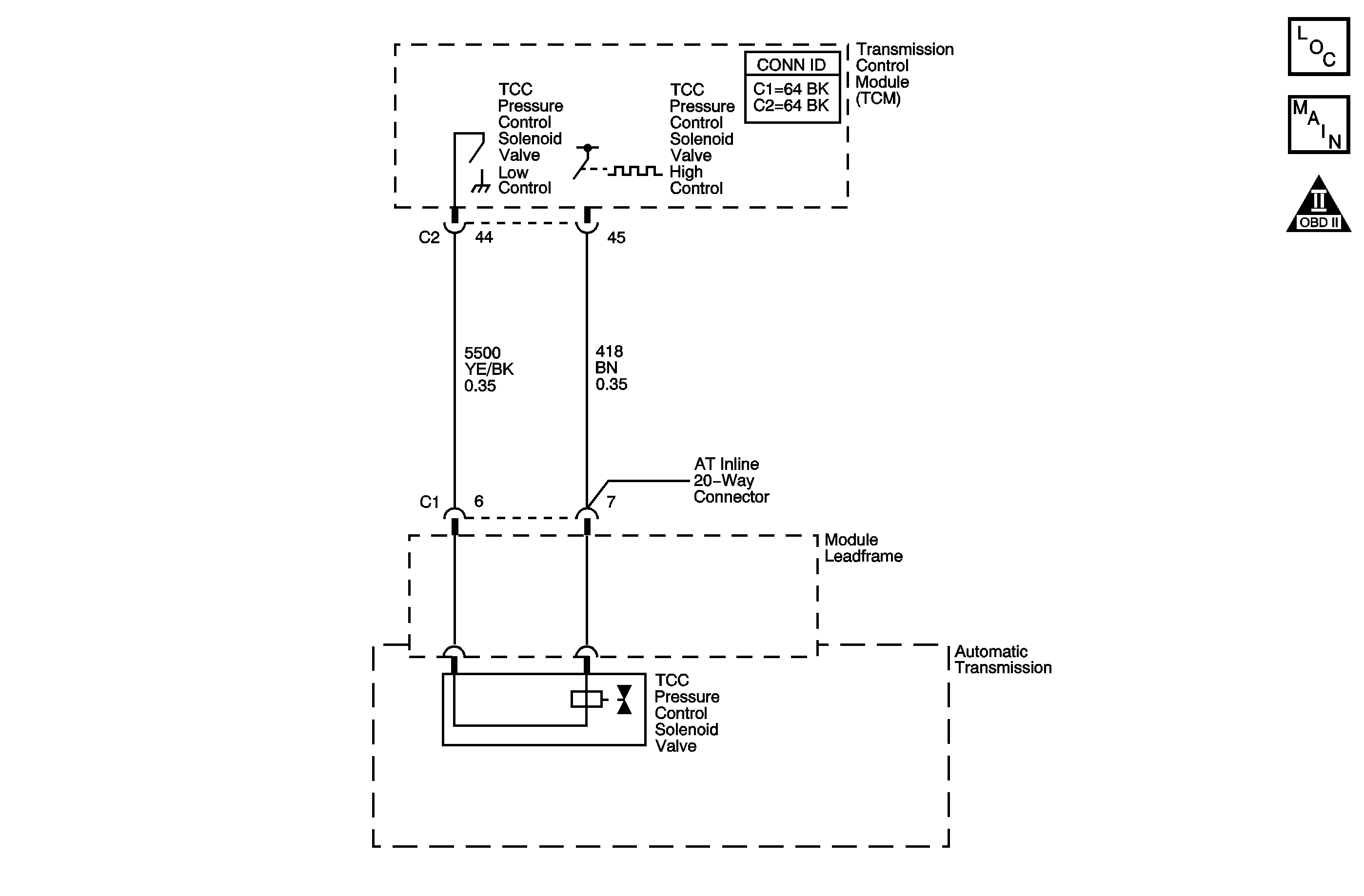
Circuit Description
The transmission control module (TCM) uses the TCC pressure control solenoid valve to apply and release the TCC system. The TCC pressure control solenoid valve is attached to the control solenoid valve assembly. The TCM compares engine and transmission inputs to determine if TCC should be applied. The TCM then regulates the pressure by applying a varying amperage to the TCC pressure control solenoid valve. The TCM then monitors the amperage at the return line.
When the TCM detects a continuous short to ground in the TCC pressure control solenoid valve circuit, DTC P0966 sets. DTC P0966 is a type B DTC.
Conditions for Running the DTC
| • | No TCC pressure control solenoid DTC P0964, or P0965. |
| • | The ignition voltage is 8-18 volts. |
| • | The engine speed is greater than 500 RPM for 5 seconds. |
Conditions for Setting the DTC
The TCM detects a continuous short to ground for 1.3 seconds.
Action Taken When the DTC Sets
| • | The TCM requests the engine control module (ECM) to illuminate the malfunction indicator lamp (MIL) during the second consecutive trip in which the Conditions for Setting the DTC are met. |
| • | The TCM inhibits TCC engagement. |
| • | The TCM turns the power off to the TCC enable solenoid valve and the TCC pressure control solenoid valve. This results in harsher garage shifts and no TCC engagement. |
| • | The TCM no longer inhibits shifting between reverse and drive when moving. |
| • | The TCM commands maximum pressure to the input clutch. |
| • | The TCM freezes garage shift transmission adaptive functions. |
| • | The TCM freezes torque converter clutch (TCC) transmission adaptive functions. |
| • | The ECM records the operating conditions when the Conditions for Setting the DTC are met. The ECM stores this information as Freeze Frame and Failure Records. |
| • | The TCM records the operating conditions when the Conditions for Setting the DTC are met. The TCM stores this information as Failure Records. |
| • | The TCM stores DTC P0966 in TCM history during the second consecutive trip in which the Conditions for Setting the DTC are met. |
Conditions for Clearing the MIL/DTC
| • | The ECM turns OFF the MIL after the third consecutive drive trip in which the TCM does not send a MIL illumination request. |
| • | A scan tool can clear the MIL/DTC. |
| • | The TCM clears the DTC from TCM history if the vehicle completes 40 warm-up cycles without an emission related diagnostic fault occurring. |
| • | The TCM cancels the DTC default actions when the ignition switch is OFF long enough in order to power down the TCM. |
Diagnostic Aids
| • | Inspect the connectors at the TCM, the transmission, and all other circuit connecting points for an intermittent condition. Refer to Testing for Intermittent Conditions and Poor Connections in Wiring Systems. |
| • | Inspect the circuit wiring for an intermittent condition. Refer to Testing for Electrical Intermittents in Wiring Systems. |
Step | Action | Values | Yes | No | ||||
|---|---|---|---|---|---|---|---|---|
1 | Did you perform the Diagnostic System Check - Engine Controls? | -- | Go to Step 2 | Go to Diagnostic System Check - Engine Controls in Engine Controls - 2.2L (L61) | ||||
2 |
Important:
Does the DTC fail this ignition? | -- | Go to Step 3 | Go to Intermittent Conditions in Engine Controls - 2.2L (L61) | ||||
3 |
Does the test lamp illuminate? | -- | Go to Step 4 | Go to Step 5 | ||||
4 |
Refer to Circuit Testing and Wiring Repairs in Wiring Systems. Did you find and correct a condition? | -- | Go to Step 10 | Go to Step 9 | ||||
5 | Connect a test lamp between the low control circuit (CKT 5500) of the TCC pressure control solenoid valve and a good ground. Does the test lamp illuminate? | -- | Go to Step 6 | Go to Step 7 | ||||
6 | Test the low control circuit (CKT 5500) of the TCC pressure control solenoid valve for a short to voltage. Refer to Testing for a Short to Voltage and Wiring Repairs in Wiring Systems. Did you find and correct the condition? | -- | Go to Step 10 | Go to Step 9 | ||||
7 | Test the high control circuit (CKT 418) for a short to the low control circuit (CKT 5500) of the TCC pressure control solenoid valve. Refer to Testing for Continuity and Wiring Repairs in Wiring Systems. Did you find and correct the condition? | -- | Go to Step 10 | Go to Step 8 | ||||
8 | Replace the TCC pressure control solenoid valve. The TCC pressure control solenoid valve is part of the control solenoid valve assembly. Refer to Control Valve Body Assembly Disassemble . Did you complete the replacement? | -- | Go to Step 10 | -- | ||||
9 | Replace the TCM. Refer to Transmission Control Module Replacement . Did you complete the replacement? | -- | Go to Step 10 | -- | ||||
10 | Perform the following procedure in order to verify the repair:
Has the test run and passed? | -- | Go to Step 11 | Go to Step 2 | ||||
11 | With the scan tool, observe the stored information, capture info and DTC info. Does the scan tool display any DTCs that you have not diagnosed? | -- | Go to Diagnostic Trouble Code (DTC) List in Engine Controls - 2.2L (L61) | System OK |
